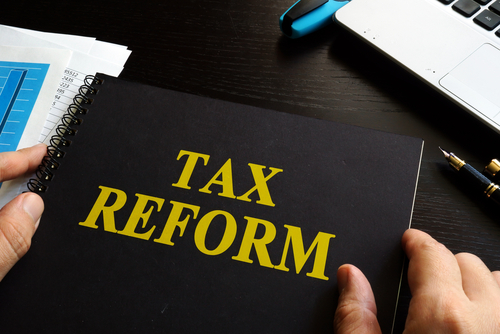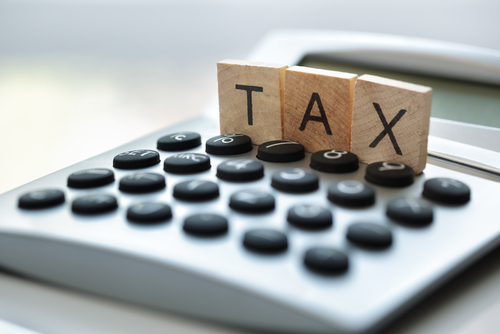Capital gains tax is a triple threat to investors.
If their investments outside of tax wrappers keep up with inflation, they’ll be taxed on anything over their annual allowance when they sell up, seriously denting their ability to keep pace with inflation. To make matters worse, the slashing of the allowance to the lowest level in over 40 years means inflation has pushed ever-larger slices of the gain into the realms of tax. And because income tax thresholds have been frozen, more of them will pay a higher rate of CGT into the bargain.
The last year we have figures for was 2021/22, when a record £16.7 billion was paid in capital gains tax. This is more than twice as much as the record inheritance tax we paid in 2022/23, of just over £7 billion, which far more people are concerned about. To make matters worse, the cuts in the CGT thresholds in 2023/24 and 2024/25 mean we could pay even more eye-watering levels of this tax in the coming years.
The tax on inflation – back to the 1970s
The fact that there’s no indexation means it’s not just the real gains being taxed – but inflation too. It takes us back to the bad old days of the 1970s, when Sir Geoffrey Howe called CGT without indexation “a capricious, and sometimes savage, levy on the capital itself.”
Anger at this situation led to the introduction of indexation, which ran from 1982 to 1998 and effectively accounted for inflation. Gordon Brown replaced it with taper relief, which didn’t match inflation, but rewarded you for holding assets for longer. At the time, he argued that in a low inflation environment, accounting for inflation wasn’t necessary. That low inflation environment seems a long way in the past now. In 2008, taper relief was axed too, so there’s no relief on the gain beyond the allowance.
The allowance goes back to the 1980s
The slashing of the CGT allowance in April will push us back to the level we had in the early 1980s, and 40 years have had a dramatic impact on the value of our money –£3,000 back then had the buying power of more than £15,000 today.
The price of wage inflation
Wages are up 7.3% in a year. Of course, in reality, when you take inflation into account, the buying power of regular pay only rose 1.4%, which has a long way to make up for earlier catastrophic falls in the buying power of our wages. However, because the tax thresholds have been frozen, the taxman takes no account of inflation. It means more people will cross the threshold into paying higher rates of tax. In the current tax year there are 5.6 million higher rate taxpayers – up 41% in just three years. Once they become higher rate taxpayers, among the many extra costs they face is that any capital gains will be taxed at 20% - or 28% for residential property.
Why this matters
It always matters that we may have to pay a huge chunk of tax on money we’ve carefully invested over the years. In this environment it’s particularly galling, because you may end up with a tax bill even if all your investments have done is kept pace with inflation. It’s also going to create problems in the coming years.
As people make investment decisions, and choose whether to sell or hang onto an asset, CGT could distort their decision-making, and persuade more people to sit on their gains, instead of taking profits and reinvesting as part of sensible portfolio management. It is also likely to encourage hoarding of assets until death – when CGT is effectively returned to zero. The capital gains tax regime needs to encourage good long term investment behaviours and so needs to provide more scope for realising profits.
It makes sense to take advantage of this year’s CGT allowance if you can. If you’re sitting on gains outside an ISA or pension, you can use the Bed & ISA process to make a gain of up to £6,000, and pay no CGT. If you haven’t used your ISA allowance yet this year, you can move up to £20,000 of the assets into an ISA wrapper, so you don’t have to worry about tax on gains (or the income) on these investments ever again. Investment companies will offer share exchange and Bed & ISA services to make this process easier.
If you’re married or in a civil partnership, you can transfer the ownership of some assets to your spouse or civil partner. There’s no CGT to pay on the transfer. When they sell up, there may well be tax to pay, and the gain will be calculated by comparing the cost on the day of selling with the day when their spouse originally bought the asset. However, they have a CGT allowance of their own to take advantage of, so a chunk of the gain won’t be subject to tax. If they’re taxed at a lower rate, they may also pay any CGT at a lower rate too.
You should also consider dividend tax when realising gains and moving assets into an ISA. The tax allowance for this is also being cut from £1,000 to £500 in April - and many people choose to prioritise moving income-producing assets into the ISA, because income tends to be taxed at a higher rate and can’t be planned for in the same way as a capital gain.”
Sarah Coles is head of personal finance at Hargreaves Lansdown:
Want to comment on this story? Our focus is on providing a platform for you to share your insights and views and we welcome contributions.
If any post is considered to victimise, harass, degrade or intimidate an individual or group of individuals, then the post may be deleted and the individual immediately banned from posting in future.
Please help us by reporting comments you consider to be unduly offensive so we can review and take action if necessary. Thank you.















.jpg)





.png)





Join the conversation
Jump to latest comment and add your reply
CGT has got to be one of the main reasons there are so few younger people becoming landlords. It's effectively a life sentence with no viable escape route other than death.
Those of us who became landlords before 2008 have been completely shafted. Our children are concerned about how we are going to cope as we become elderly and frail. There's no way they're going to take a similar path.
When we bought there was indexation or taper relief. It kind of made up for the fact we have never been able to pay rental profits into a pension and enjoy the tax benefits everyone else enjoys.
The current system is pure theft. Sell a 5 bedroom house and finish up with enough cash to buy a 3 bedroom house. That's after we have paid punitive levels of tax on turnover that no other industry pays. In reality a lot of us simply won't sell. We will carry on until we die so have also been robbed of a retirement.
I’m 23 years old and I’ve recently purchased a property on cash.
I’ve missed out on the “university experience” as I got myself into work as an accountant immediately after Sixth Form, and I lived with my parents to save on rent.
No wonder my peers are living a hedonistic lifestyle, because people that make sacrifices such as ourselves are being punished.
Agree with what you’re saying, but i will be selling BEFORE I die ☠️, yes I will pay more tax, but I want to use the remainder of the cash to enjoy MY retirement, having multiple houses all free of CGT will do me no good if I am dead 💀 . I purchased properties for my benefit and had them on a capital and repayment basis for that reason. They are now mortgage free . I intend to enjoy that money. 💵💵, I have already gifted my children a small fortune. Time for my wife and I now.
The “Conservative” Party is a sick animal.
It must be put down. Vote for Reform Party and get ourselves a party that actually has an interest in stopping economic degeneracy.
Whether or not Mr Tice will do what he promises is one thing, but we now know the Conservatives Party are not to be trusted AT ALL.
They fail to conserve economic heath, they fail to conserve our borders, they fail to conserve our public safety and infrastructure.
We need Reform. Give Labour a real fingernail biting opposition party instead of this so-called “party of business” so-called Conservative Party.
Totally agree John
Good job you dont stay in Scotland you'd be suicidal with this lot up here! Watch what you wish for.
CGT is a gross and exploitative tax and all the more so for private landlords. The problem is that if Gov ease the CGT burden it will prompt a huge acceleration of LL’s leaving the sector.
Cynically perhaps, I think Gov are also using the tax to ‘lock in’ LL’s as the housing crises grows toward ‘emergency levels’
I don't think it would prompt a huge acceleration of LLs leaving the sector. It depends how it was done but if we used something similar to the French model CGT tapers to zero after 22 years and there are no Social charges after 30 years.
Most landlords buy one house at a time. Of my 16 rental properties I've only owned one for more than 30 years. Another 4 for between 20 and 24 years. The other 11 for between 2 and 15 years.
If I wanted to sell anything right now I would sell some of the more recently purchased properties purely because the CGT is much, much lower. In many respects that would be fairly stupid as the more recently purchased properties generally require less day to day input. The properties I've owned the longest are very well located bigger student houses and HMOs, which would sell to other landlords. With CGT as it is currently I'm not going to sell them. The CGT bill per house would be roughly £100K. That's theoretically half a million pounds the government won't be getting.
If the French system was adopted I may sell them as they hit the 30 year point. Then the government would get SDLT and VAT from the new purchaser. VAT on my legal bill for selling. Shedloads of VAT and income tax from whatever improvements the new owner chose to do. VAT on whatever I spent some of the money on. Some would be gifted to my children or grandchildren. They would spend some of it and more VAT and income tax would result.
The real danger with the reduced CGT annual allowance is there is no incentive whatsoever to remain in the industry or gradually time a departure. Anyone who would otherwise sell one property a year to best utilise the CGT allowance will now just sell the whole lot at the earliest opportunity as there is no incentive not to. If someone actually wants a retirement they may as well just sell when the mood takes them. The longer they hang in there the bigger slice of their investment the government takes.
It's not even that the government are guaranteed to get it as IHT if we don't sell. We can always suck out most of the equity by remortgaging before we are 70.
It’s Genocide of the Private Rented Sector, one Council has Demolished their Civic Centre now Developers are in making a killing with construction of between 1000 & 1500 Flats take your pick you’ll need a lot of swarfega there, also withdrawn the Telephone line for licensing service so its on-line only but they have blocked my emails so no communication possible. Property Vacant because it can’t be let without a license, potential Tenants crying out for it but they can’t Rent it and I can’t let it, people sleeping in tents in Council Office Doorways this Weather well done Mr Michael Gove.
Just be thankful your not all in Scotland .. we pay 6% LBTT on second/BTL homes purchased. There is also a 6 month exemption period where empty properties don't pay council tax, this is being reviewed and may be changed to "double council tax" for empty properties! Your in the land of milk and honey in England, please help us get rid of this lot.
100% Responsible landlord. That's why I'm selling... I'm taking the hit with capital gains because I think it's only gong to get worse in Scotland and the UK in general. My take on it is... Get out whilst you still can!
There are tax strategies for moving properties into a limited company without payment of personal CGT, and you can then pass control of the company to your children before you die. It's then up to them to decide whether to wind up the company or run it as an investment company or, better, a development company with rental stock, from which they can steadily withdraw income and surplus capital as dividends as they wish over an extended period.
I appreciate this can look like letting the tax tail wag your capital dog, but how much money does one need in retirement, really, especially when you could well end up being bled dry by nursing home fees as well as CGT? I am approaching retirement but I can't see myself selling more than a couple of properties and taking a CGT hit, for some extra spending money and to give my young adult daughter as cash assets. The remainder will be in a corporate structure for her to run as she sees fit, with my advice and training on the side so she understands her options, as she decides whether she wants to run a business and/or have an employed career.
Shane is absolutely right. Get out while you can. The way things are going we shall be back to the 1970’s with protected rents and sitting tenants. Such properties found their value reduced by fifty per cent. I was around then and actually bought a property with sitting tenants. However in those days the landlords weren’t governed by all the regulations we have now.
Please login to comment